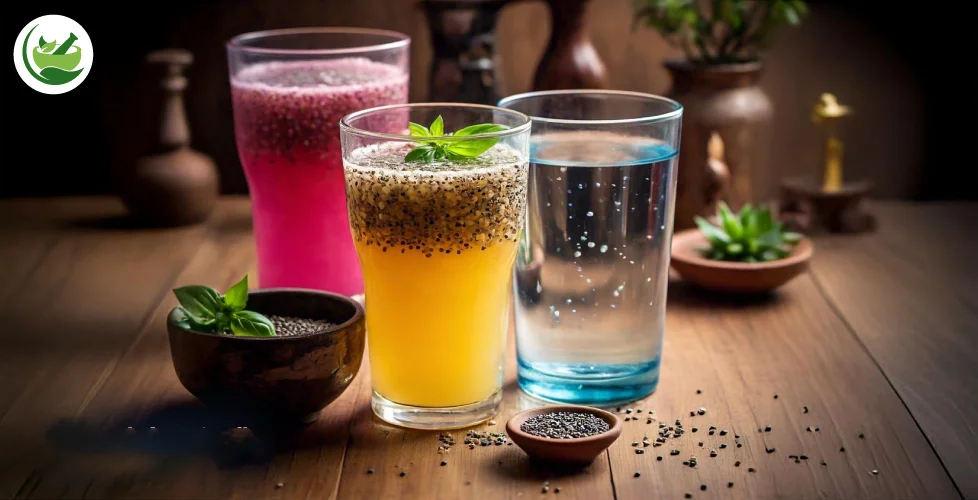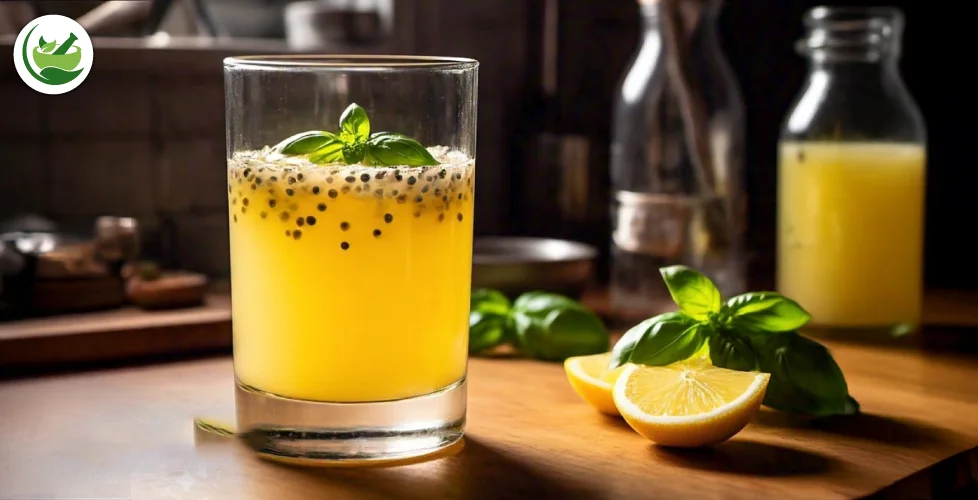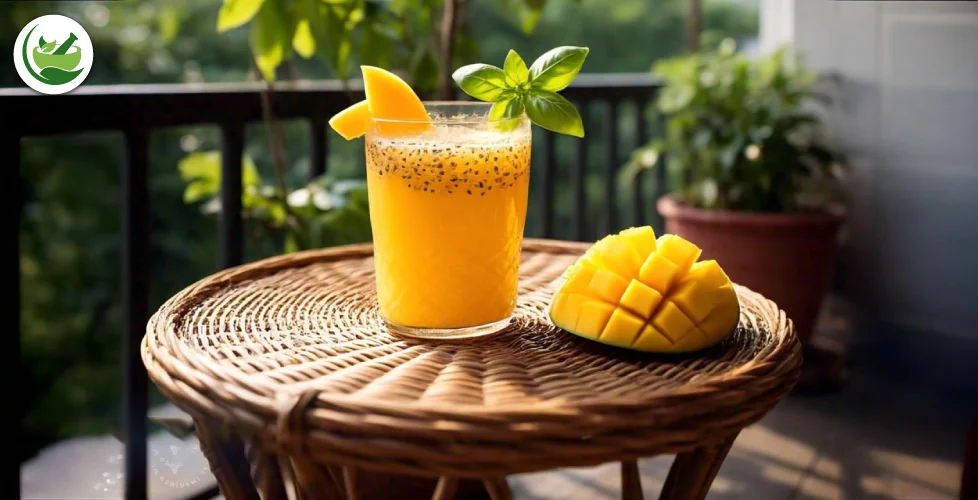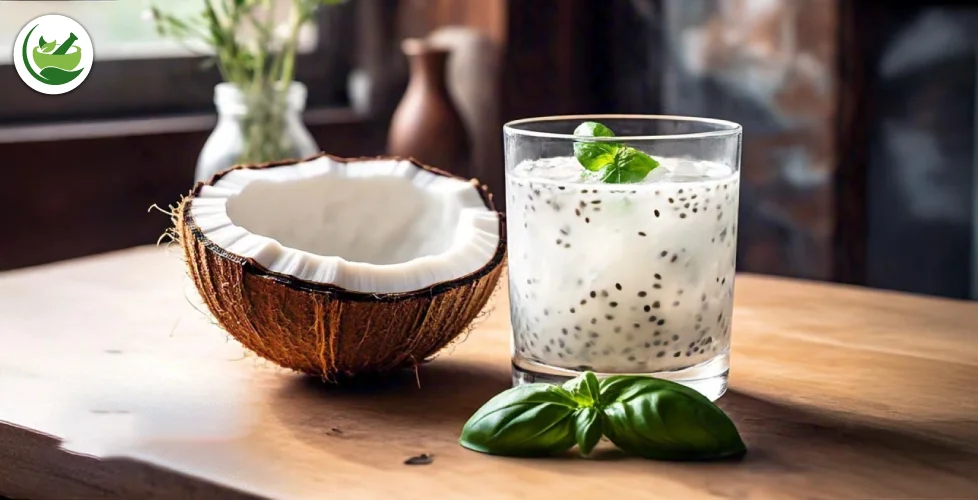
Basil seeds, also known as Tukmaria, are tiny black seeds that pack a powerful nutritional punch. Despite their small size, they are loaded with health benefits and have been used for centuries in traditional medicine. Whether you’re looking to improve digestion, boost immunity, or manage your weight, Sabja seeds are a versatile and effective addition to your diet.
Related: Exploring the Health Benefits: Chia Seeds vs Basil Seeds
What Are Basil Seeds (Tukmaria)?
Basil seeds are small, black seeds that come from the same plant as the sweet basil herb, but they are not as commonly known as their leafy counterpart. They resemble chia seeds, although Sabja seeds are slightly smaller and have a darker hue.
The seeds are used in a variety of traditional medicines and are often found in popular drinks in Southeast Asia, including the well-known basil seed drink. Their nutritional profile and health benefits make them a staple in many natural wellness routines.
Basil Seeds Calories
Basil seeds are low in calories, making them an excellent choice for weight management. A single tablespoon (13 grams) of Sabja seeds contains approximately 60 calories, packed with fiber and essential nutrients. This makes them a nutritious addition to meals without significantly increasing caloric intake.
Related: Is Chia Seeds and Tukmaria the Same? Exploring Their Similarities and Differences
Basil Seeds Juice: A Refreshing and Healthy Beverage
Basil seed juice, made by soaking tukmaria (Sabja seeds) in water and then blending them with other ingredients, is a refreshing and healthy drink. Here’s a simple recipe for making basil seed juice:
Ingredients:
- 2 tablespoons of basil seeds (tukmaria)
- 1 glass of water
- 1-2 tablespoons of honey or sweetener (optional)
- 1 tablespoon of lemon juice (optional)
- 1-2 mint leaves (optional)
- Ice cubes (optional)
Instructions:
- Soak the Basil Seeds:
- Place the basil seeds in a small bowl. Add 1 cup of water and let them soak for 15–20 minutes. The seeds will absorb the water and swell, forming a gel-like consistency.
- Prepare the Juice:
- In a blender, combine the soaked basil seeds, water, honey (or sweetener), and lemon juice (if using). Blend until smooth.
- Optional Add-ins:
- You can add mint leaves or ice cubes for extra flavor and freshness.
- Serve:
- Pour the juice into a glass, stir well, and enjoy!
Different Types of Basil Seed Juice
Basil seeds, also known as sabja seeds or tukmaria, are the edible seeds of the sweet basil plant (Ocimum basilicum) and have been widely used in culinary and health applications. These seeds, when soaked in water, swell up and form a gel-like texture, making them an excellent addition to beverages. Basil seed juice, made with a variety of fruits, herbs, and sweeteners, is both refreshing and packed with numerous health benefits. Below are the different types of basil seed juice and their unique characteristics.
1. Basic Basil Seed Lemon Juice

This is one of the simplest and most popular basil seed drinks. The combination of soaked Sabja seeds with freshly squeezed lemon juice makes for a tangy and rejuvenating beverage. This juice is a great source of vitamin C and antioxidants, boosting the immune system and improving digestion. Adding a bit of honey or a pinch of salt can enhance its flavor and health benefits.
Ingredients:
- Basil seeds
- Fresh lemon juice
- Honey or sugar (optional)
- Salt (optional)
- Water
2. Basil Seed and Mango Juice

Mangoes, being rich in vitamins and minerals, pair beautifully with Sabja seeds to create a tropical, hydrating drink. Mango juice combined with soaked Sabja seeds offers a flavorful and nutrient-packed drink that helps with digestion and supports overall well-being. This juice is particularly refreshing during hot weather.
Ingredients:
- Fresh mango pulp or juice
- Soaked basil seeds
- Sweetener (optional)
- Water or ice cubes
3. Basil Seed and Coconut Water Juice

For a hydrating and electrolyte-replenishing drink, Sabja seeds mixed with coconut water are an excellent choice. Coconut water is packed with potassium and magnesium, while Sabja seeds offer a cooling effect. This juice is ideal for rehydration after a workout or a long day in the sun.
Ingredients:
- Coconut water
- Soaked basil seeds
- Sweetener (optional)
- Lime juice (optional)
Related: Exploring the Sexual Benefits of Chia Seeds: What You Need to Know
Exploring the Health Benefits of Basil Seeds (Tukmaria)
Basil seeds, also known as sabja seeds or tukmaria seeds, offer a range of health benefits. Here are some of their key advantages:
- Rich in Nutrients: Basil seeds are packed with essential nutrients like fiber, protein, and healthy fats. They are also a good source of minerals like calcium, magnesium, and iron.
- Digestive Health: The high fiber content in Sabja seeds promotes healthy digestion and helps in alleviating constipation. They act as a natural laxative, supporting smooth bowel movements.
- Hydration: When soaked in water, Sabja seeds expand and develop a gelatinous coating. This makes them an excellent source of hydration, especially during hot weather.
- Weight Management: Basil seeds help control hunger by providing a feeling of fullness due to their high fiber content. This can help in reducing overall calorie intake and managing weight.
- Detoxification: Basil seeds have detoxifying properties, helping to cleanse the body by flushing out toxins and promoting liver health.
- Supports Blood Sugar Control: Basil seeds may help regulate blood sugar levels, making them beneficial for individuals with diabetes. They contain compounds that slow down the digestion of carbohydrates.
- Improves Skin Health: The antioxidants in basil seeds can help improve skin texture, reduce acne, and fight inflammation. They also help in soothing irritated skin.
- Boosts Immunity: Sabja seeds have immune-boosting properties due to their high content of antioxidants and other beneficial compounds that can help fight infections.
- Anti-Inflammatory: Basil seeds have anti-inflammatory properties, which can help reduce inflammation in the body and alleviate pain associated with conditions like arthritis.
- Promotes Heart Health: The healthy fats and antioxidants found in Sabja seeds can support heart health by reducing bad cholesterol levels and improving overall cardiovascular function.
Related: Maximizing Health with Every Sip: The Comprehensive Guide to Chia Seeds in Tea Benefits
Basil Seeds Fiber
Basil seeds are an excellent source of dietary fiber. Their high fiber content aids in promoting digestive health, helping to prevent constipation and improve overall gut health. Fiber also supports weight management by keeping you feeling full for longer periods, thereby preventing overeating. In addition, the soluble fiber in basil seeds helps regulate blood sugar levels, making them a beneficial addition for people managing diabetes.
How to consume Basil Seeds (Tukmaria) ?
Soak the seeds in water for 15-20 minutes until they absorb the liquid and form a gel-like coating.
Once transformed, add them to various dishes:
- Stir them into smoothies or beverages for a nutritious boost.
- Sprinkle them over salads to enhance both flavor and nutritional value.
- Mix them into yogurt or other dairy products for a satisfying crunch and health benefits.
There are numerous ways to include them in your diet; however, it’s important to consume them in moderation, as excessive intake of Sabja Seeds may cause discomfort. If you have allergies or any medical conditions, it’s advisable to consult your healthcare provider before adding Sabja Seeds to your diet.
While most people focus on the benefits, it’s also wise to be aware of potential side effects. Though generally safe, it’s helpful to understand any negative impacts they might have on your health. Continue reading for a more detailed explanation.
Is It OK to Drink Basil Seeds Every Day?
Drinking basil seeds, also known as tukmaria or sabja seeds, on a daily basis can offer several health benefits when consumed in moderation. These seeds are rich in fiber, antioxidants, and essential nutrients, which can aid in digestion, promote hydration, and support overall health. They are also believed to help regulate blood sugar levels, boost metabolism, and improve skin health. However, it’s important to note that overconsumption may lead to digestive discomfort or bloating due to their high fiber content. As with any food or supplement, it’s best to consume Sabja seeds in moderation, ideally as part of a balanced diet, and consult with a healthcare provider if you have any underlying health conditions or concerns.
What are the side effects of Basil Seeds (Tukmaria)?
Tukmaria, also known as basil seeds or sabja seeds, are often used in traditional medicine and as a food ingredient due to their nutritional benefits. While they are generally considered safe when consumed in moderate amounts, some potential side effects can occur, especially if consumed in excessive amounts or if you’re sensitive to certain compounds.
Here are some possible side effects:
- Digestive Issues: Can cause bloating, gas, or an upset stomach, especially in large quantities.
- Allergic Reactions: Possible itching, rashes, or swelling, though rare.
- Hypoglycemia: May lower blood sugar levels, so those with diabetes or hypoglycemia should be cautious.
- Choking Hazard: Can pose a choking risk if consumed dry without sufficient water, as the seeds expand and form a gel.
- Interference with Medication: May interact with medications, particularly those for blood sugar, blood pressure, or anticoagulants.
- Pregnancy and Breastfeeding: Limited research on safety, so it’s advised to consult a doctor before use during pregnancy or breastfeeding.
Related: The Impact of Chia Seed Benefits for Diabetes on Blood Sugar Management
Conclusion
Basil seeds, or Tukmaria, are a superfood that offers a wide array of health benefits. Packed with fiber, antioxidants, omega-3 fatty acids, and essential minerals, these tiny seeds support everything from digestive health and weight management to heart and skin wellness. With their versatility and ease of incorporation into your diet, Sabja seeds are an excellent addition to any wellness routine.
Whether you’re looking to improve your hydration, regulate blood sugar, or boost your skin health, Sabja seeds are a powerful, natural solution. Embrace the many benefits of these small seeds and make them a part of your healthy lifestyle today!






